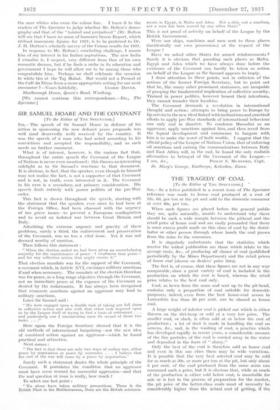SIR SAMUEL HOARE AND THE COVENANT
[To the Editor of TIIE SPECTATOR.]
Sill,—The speech of Sir Samuel Hoare in defence of his action in sponsoring the now defunct peace proposals was well (and deservedly well) received by the country. It
was the speech of a man who had acted according to his convictions and accepted the responsibility, and as such needs no further comment.
What is of interest, however, is the curious fact that, throughout the entire speech the Covenant of the League of Nations is never even mentioned ; this throws an interesting sidelight as to Sir Samuel's reactions to that document.
It is obvious, in fact, that the speaker, even though he himself may not realise the fact, is not a supporter of that Covenant and is not, in truth, even interested in it. The Covenant in his eyes is a secondary, not primary consideration. His speech deals entirely with power politics of the pre-War order.
This fact is shown throughout the speech, starting with the statement that the speaker, ever since he had been at the Foreign Office, had been . obsessed with the urgency
of trpo grave issues—t0 prevent a European conflagration and to avoid an isolated war between Great Britain and
Italy.
Admitting the extreme urgency and gravity of these problems, surely a third, the enforcement and preservation of the Covenant, was no less a vital issue. Yet it was not deemed worthy of mention.
Then follows this statement :
" When the election ended we had been given an overwhelming majority for the maintenance of peace—I emphasise that point— and for any collective action that might ensure it."
That election mandate was for the support of the Covenant, a covenant which, in Article XVI, envisages military sanctions if and when necessary. The mandate at the election therefore was for peace, as a long range objective through the Covenant, not an immediate peace at the expense of the Covenant as
desired by the isolationists. It has always been recognised that economic sanctions against an aggressor may lead to military sanctions.
Later Sir Samuel said :
"We were engaged upon a double task of taking cur full share in collective action and also with that other task imposed upon us by the League itself of trying to find a basis of settlement . . . and particularly was I conc,entrating upon the second of thoso two tasks. . ."
Here again the Foreign Secretary • showed that it is the old methods of international bargaining—not the new idea of combined action against an aggressor—which he found practical and attractive.
Next comes :
"The fact is that there are only two ways of ending war, either peace by negotiation or peace by surrender. . . . I believe that the end of the war will come by a peace by negotiation."
Surely such a statement denies the whole principle of the Covenant. It postulates the condition that an aggressor.
must have some reward for successful aggression—and that the real question at issue is really, how much ? To select one last point :
"We alone have taken military precautions. There is the British Fleet in the Mediterranean, there are the British reinforce7
ments in Egypt, in Malta and Aden. Not a ship, not a machine,. not a man has been moved by any other State. '
This is not proof of activity on behalf of the League by the British Government.
Were our ships, machines and. men sent to these places (incidentally our own possessions) at the request of the League ?
Have we asked- other States for armed reinforcements ? Surely it is obvious that guarding such places as Malta, Egypt and Aden which we have always done before the existence of the Covenant can hardly be taken as action on behalf of the League as Sir Samuel appears to imply.
I draw attention to these points, not in criticism of the actions of the former Foreign Secretary, but to point out that he, like many other prominent statesmen, are incapable of grasping the fundamental implication of collective security. Trained in power politics, however honest their, Antentions, they cannot transfer their loyalties.
The Covenant demands a revolution in international thought and action : attempts to bring peace to Europe by lip-service to the new ideal linked with inclinations and practical
efforts to apply pre-War standards of international behaviour; can only end in disaster. To condemn Mussolini as an
aggressor, apply sanctions against him, and then recoil from the logical development and commence to bargain with him is to make the worst of both worlds. I suggest that the.
official policy of the League of Nations Union, that of enforcing oil sanctions and cutting the communications between Italy, and East Africa will, in the end, be found the only realistic alternative to betrayal of the Covenant of the League.—


































 Previous page
Previous page